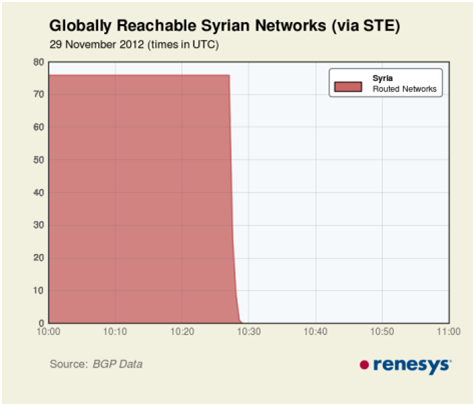Could your country be shut off from the Internet?
On Thursday 29th November, at 10:26am UTC Syria disappeared. Not geographically, not politically, but digitally. Syria went dark. The plugs were pulled.
According to network inspectors Renesys, there were a still a few Syrian networks connected to the internet, but some 12 hours later those five networks were taken offline as well.
The digital lights went out.
The chart is impressive. One moment there’s a huge chunk of internet traffic and the next, it’s gone – like driving off a cliff face.
Three days later, Syria was back online, but big questions need to be asked. Clearly the blackout was due to the civil war raging in the country and the fact that it did come back online as quickly as it went offline suggests some kind of kill switch was activated. Indeed, Renesys notes that the country actually went offline for 10 minutes four days earlier. It points to a small dry run for the shutdown, though that is only a presumption.
But the question has to be asked how an entire country was able to be taken offline in one fell swoop? The received wisdom is that the internet has been designed to be inherently resilient and resistant to attacks and sabotage – so it’s quite disconcerting that a geo-political area can be removed from cyberspace so efficiently.
The key to this supposed strength comes from decentralisation of key facilities, service, power-centres, routing equipment etc. But on a national scale this decentralisation can be neutered by the fact that the government or a small number of companies can control access to these key facilities.
To analyse the situation Renesys has created a map of the countries most at ‘Risk of Internet Disconnection’ judged by how many sources of connectivity a country has to international connections.
Countries with at more than 40 internationally connected service providers are deemed low-risk, 10-40 low-risk, fewer than 10 high-risk, and those with only one or two are deemed at severe risk. There are 61 countries in this category and no surprise to find that Syria is one of them.
This sort of information is worth considering carefully, especially for companies that are concerned about where their data may be housed. But it also shows how free internet access is tied very closely to the spread of democracy and political change, and how limiting that is a tool of those that want to take those freedoms away. Removing that access is essentially an act of terrorism, and protecting that freedom is something worth fighting for.
The importance of internet access for political and economic reasons was championed at the Broadband World Forum 2012 by Neelie Kroes, vice-president responsible for Digital Agenda, European Commission, and these issues are sure to be raised once again at the upcoming Broadband World Forum MEA, taking place on the 19th-20th March 2013 at the JW Marriott Marquis Hotel, Dubai, UAE, Dubai, UAE- you can click here to find out more about the event.
Next: Balance, not headlines. Why reliable broadband for all should be the priority
Previous: Google Fiber success has created some unhappy residents in ‘fiberhoods’
Comments
-
Be the first to leave a comment.
Post a Comment
Have a comment? Login or create an account to start a discussion.




